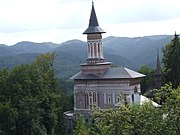| Târgu Lăpuș | |
|---|---|
| Town | |
 Union Monument (1935) and Reformed Church (1863) Union Monument (1935) and Reformed Church (1863) | |
 Coat of arms Coat of arms | |
 Location in Maramureș County Location in Maramureș County | |
 | |
| Coordinates: 47°27′9″N 23°51′47″E / 47.45250°N 23.86306°E / 47.45250; 23.86306 | |
| Country | Romania |
| County | Maramureș |
| Government | |
| • Mayor (2020–2024) | Mitru Leșe (PNL) |
| Area | 247.35 km (95.50 sq mi) |
| Elevation | 334 m (1,096 ft) |
| Population | 11,163 |
| • Density | 45/km (120/sq mi) |
| Time zone | EET/EEST (UTC+2/+3) |
| Postal code | 435600 |
| Area code | (+40) 02 62 |
| Vehicle reg. | MM |
| Website | primariatargulapus |
Târgu Lăpuș (Romanian pronunciation: [ˌtɨrɡu ləˈpuʃ]) (Hungarian: Magyarlápos, Yiddish: מאדיאר-לאפאש, romanized: Madjar Laposh, German: Laposch) is a town in Maramureș County, northern Transylvania, Romania. It administers thirteen villages: Boiereni (Boérfalva), Borcut (Borkút), Cufoaia (Kohópatak), Dămăcușeni (Domokos), Dobricu Lăpușului (Láposdebrek), Dumbrava (Kisdebrecen), Fântânele (until 1960 Poiana Porcului; Lápospataka), Groape (Groppa), Inău (Ünőmező), Răzoare (Macskamező), Rogoz (Rogoz), Rohia (Rohi), and Stoiceni (Sztojkafalva).
Geography
The town is situated at the northwestern edge of the Transylvanian Plateau, at the foot of the Lăpuș Mountains. It lies on the banks of the river Lăpuș and of its tributary, the river Suciu, which flows into the Lăpuș in Dămăcușeni village. The 36 km (22 mi)-long Lăpuș Gorge [ro] is a protected area on the western side of the town, between the villages of Răzoare and Remecioara. Lighet Lake [ro] is a reservoir in the southeastern part of the town; with a surface area of 4 hectares (10 acres), it is stocked with common, crucian, and grass carp, Alburnus, rudd, and perch.
Târgu Lăpuș is located in the southern part of Maramureș County, on the border with Cluj and Sălaj counties. It is the center of the Țara Lăpușului [ro] ethnographic region. The town is crossed by national road DN18B [ro], which runs from the county seat, Baia Mare, 43 km (27 mi) to the northwest, to Cășeiu commune (near Dej), 40 km (25 mi) to the south.
Sights
The Church of the Holy Archangels in Rogoz village is one of eight Wooden Churches of Maramureș listed by UNESCO as a World Heritage Site. Among the town's historic buildings are also the Roman Catholic church (1752), the Calvinist church (1839), the Orthodox church (1906–1912), the old school (1858), and the old town hall, now a dispensary (19th century). Rohia Monastery is also located within the town limits.
The Union Monument is an obelisk located behind the Reformed Church. The monument commemorates the 21 inhabitants of Târgu Lăpuș who were massacred by Hungarian troops in December 1918 while celebrating the Union of Transylvania with Romania.
Demographics
At the 2021 census, Târgu Lăpuș had a population of 11,163; of these, 77.8% were Romanians, 9.5% Hungarians, and 1% Roma. At the 2011 census, the town had a population of 11,744, of which 86.5% were Romanians, 12.4% Hungarians, and 1% Roma; 74.5% belonged to the Romanian Orthodox Church, 10.1% to the Reformed Church, 7.3% were Pentecostal, 4% Greek-Catholic, and 2.7% Roman Catholic.
| Year | Pop. | ±% |
|---|---|---|
| 1880 | 9,093 | — |
| 1900 | 10,526 | +15.8% |
| 1910 | 11,074 | +5.2% |
| 1930 | 10,312 | −6.9% |
| 1956 | 11,780 | +14.2% |
| 1966 | 12,361 | +4.9% |
| 1970 | 12,929 | +4.6% |
| 1977 | 13,218 | +2.2% |
| 1992 | 14,303 | +8.2% |
| 2002 | 13,358 | −6.6% |
| 2011 | 11,744 | −12.1% |
| 2021 | 11,163 | −4.9% |
| Source: Census data | ||
Natives
- Ferenc Benkő [ro] (1745–1816), cleric and mineralogist
- Herman Berkovits (b. 1947), physician
- Grigore Leșe (b. 1954), musician
- Remus Ludu (1914–1982), gymnast
- Árpád-Francisc Márton [ro] (b. 1955), politician
- Onișor Nicorec (b. 1986), footballer
- Vasile Oană (b. 1972), footballer
Economy
Răzoare is an old mining village, with iron ore and manganese (as well as muscovite, bentonite, and kaolinite) being exploited here since 1770. Other minerals found in the area are magnetite, garnet, dannemorite, beryl, tourmaline, leucophoenicite, ribbeite, sodalite, and alleghanyite. The Răzoare mine opened in 1988; its closure in 2006 was a heavy blow to the local economy and led to a drop in the town's population.
Education
The town has two high schools: the Petru Rareș Theoretical High School and the Grigore C. Moisil Technological College.
References
- "Results of the 2020 local elections". Central Electoral Bureau. Retrieved 14 June 2021.
- "Populaţia rezidentă după grupa de vârstă, pe județe și municipii, orașe, comune, la 1 decembrie 2021" (XLS). National Institute of Statistics.
- ^ Opriș, Nick (March 20, 2012). "Cheile Lăpușului – Arie Naturală Protejată". Informația Zilei (in Romanian). Retrieved January 20, 2022.
- "Lacul Lighet, o oază de liniște". www.emaramures.ro (in Romanian). May 25, 2018. Retrieved January 20, 2022.
- Opriș, Nick (October 9, 2018). "La Tg. Lăpuș – Monumentul eroilor, în straie noi". Graiul Maramureșului (in Romanian). Retrieved January 20, 2022.
- "Monumentul eroilor de la Târgu Lăpuș, la 72 de ani de existență". ziare.com (in Romanian). August 7, 2018. Retrieved January 20, 2022.
- "Populația rezidentă după grupa de vârstă, pe județe și municipii, orașe, comune, la 1 decembrie 2021" (in Romanian). INSSE. 31 May 2023.
External links
- "Țara Lăpușului – Colțul de rai al Maramureșului". Gazeta de Nord-Vest (in Romanian). July 26, 2018. Retrieved January 20, 2022.
-
Reformed church (18th century)
-
Roman Catholic church (1831)
-
Old school (1858)
-
Police station and former town hall (19th century)
-
Church of the Holy Archangels in Rogoz (1633)
-
 Rohia Monastery (1923)
Rohia Monastery (1923)

